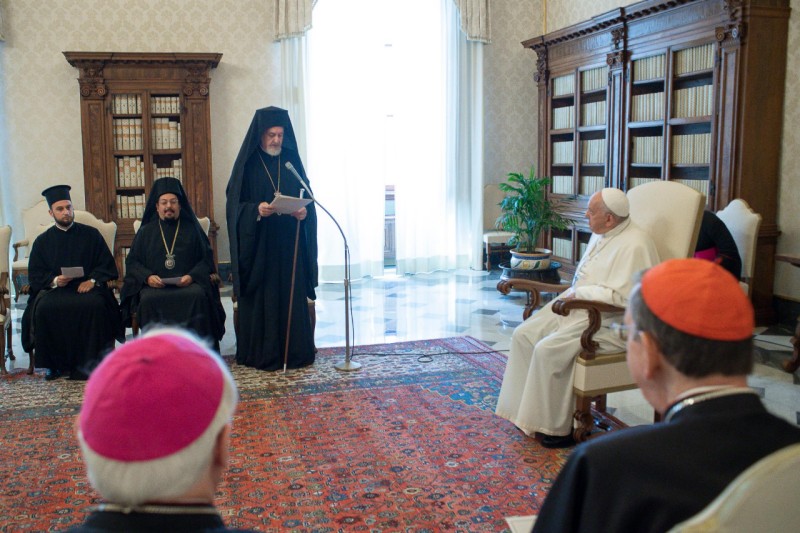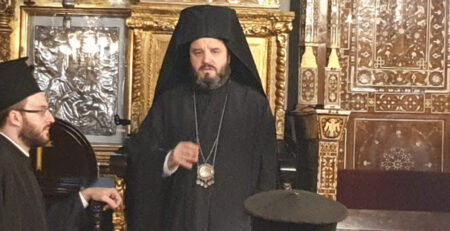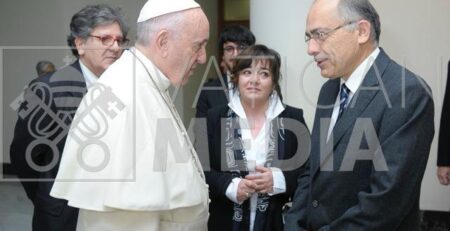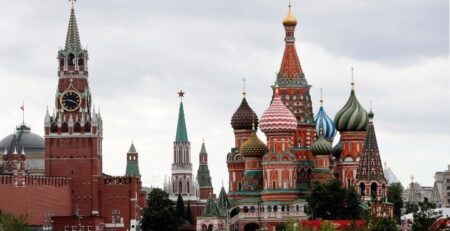Χαλκηδόνος Εμμανουήλ: Η διάδοση του Ευαγγελίου στον κόσμο δεν είναι θέμα στρατηγικής
«Φοβάμαι ότι σκεφτόμαστε περισσότερο για την επιβίωση του Χριστιανισμού, παρά για να μοιραστούμε τα καλά νέα του αναστημένου Χριστού», τόνισε ο Μητροπολίτης Χαλκηδόνος Εμμανουήλ. Ο κ. Εμμανουήλ επικεφαλής αντιπροσωπείας του του Οικουμενικού Πατριαρχείου παρέστη χθες στην Λειτουργία στην Βασιλική του Αγίου Πέτρου που τέλεσε ο Πάπας Φραγκίσκος για την εορτή της μνήμης των Αποστόλων Πέτρου και Παύλου.
Η συνέντευξη δόθηκε στον δημοσιογράφο Andrea Tornielli και δημοσιεύτηκε στο πρακτορείο Vaticannews. Στην εισαγωγή της συνέντευξης ο δημοσιογράφος αναφέρει: «Ο Μητροπολίτης Εμμανουήλ έφυγε από τη Γαλλία, πριν από λίγους μήνες, για να αναλάβει την Μητρόπολη Χαλκηδόνος, πράγμα που τον καθιστά ως το νούμερο δύο στην ιεραρχία του Οικουμενικού Πατριαρχείου. Είναι απεσταλμένος του Πατριάρχη Βαρθολομαίου για τον εορτασμό των Αγίων Πέτρου και Παύλου. Στη συνέντευξη με τα μέσα ενημέρωσης του Βατικανού καταγράφει το οικουμενικό ταξίδι, σχολιάζει τις τελευταίες εγκυκλίους του Πάπα Φραγκίσκου και σχετικά με το θέμα της ευαγγελισμού υπενθυμίζει: ¨Το πρόβλημα δεν είναι η παγκοσμιοποίηση, αλλά η σχέση μας με τον κόσμο”».
Στην συνέντευξη ο Μητροπολίτης Γέρων Χαλκηδόνος, Εμμανουήλ, ανάμεσα σε άλλα , σημείωσε:
*Η διάδοση του Ευαγγελίου στον κόσμο δεν είναι θέμα στρατηγικής. Φοβάμαι ότι σκεφτόμαστε περισσότερο για την επιβίωση του Χριστιανισμού παρά για να μοιραστούμε τα καλά νέα του αναστημένου Χριστού. Πράγματι, βλέπουμε πώς η μεταμοντέρνα εποχή προκαλεί συστηματικά κάθε μορφή θεσμού. Οι Εκκλησίες μας δεν είναι απαλλαγμένες από αυτήν τη διάσταση της σύγχρονης εκκοσμίκευσης. Αυτό το φαινόμενο είναι πραγματικό και αγγίζει την καρδιά της αποστολής μας ως Χριστιανών .
*Ο Χριστός είναι το άλφα και το ωμέγα της αποστολής μας. Είναι ταυτόχρονα παρών στο ταξίδι, μέσω του οποίου μεταδίδεται η πίστη, και το τέλος αυτού του πνευματικού ταξιδιού.
*Σε ορισμένα μέρη του κόσμου οι Χριστιανοί διώκονται για την πίστη τους. Ναι, σε ορισμένα μέρη του κόσμου η εκοσμίκευση περιθωριοποιεί τον Χριστιανισμό.
*Βλέπω στα δύο έγγραφα του Πάπα Φραγκίσκου βλέπω μια μεγάλη ευκαιρία για διάλογο και για να πλησιάσουμε πιο κοντά. Όμως, θα ήθελα να τονίσω εδώ τη σημασία του Οικουμενικού Πατριάρχη Βαρθολομαίου τόσο ως προς την προστασία του περιβάλλοντος όσο και ως προς αυτό το ήθος αλληλεγγύης. Ο Οικουμενικός Πατριάρχης έχει επανειλημμένα τονίσει την αλληλεξάρτηση μεταξύ της διατήρησης της φύσης και της φροντίδας των άλλων. Αυτή η πνευματική ανάγνωση του κόσμου διαλύει τις βεβαιότητές μας και μας κάνει να γνωρίζουμε την ευθύνη των Χριστιανών να αγκαλιάσουν με ευγνωμοσύνη τον κόσμο, τη δημιουργία και τα συστατικά του. Οφείλουμε αυτήν τη σχεδόν μυστική σύνθεση. Όλη η δημιουργία γίνεται μυστήριο, ένα μυστήριο στο οποίο αποκαλύπτεται η σωτήριος παρουσία του Θεού, το οποίο μπορεί να πραγματοποιηθεί μόνο με θυσία, προσφέροντας στον Θεό αυτό που ο Θεός μας έχει προσφέρει.
Ο Οικουμενικός Πατριάρχης Βαρθολομαίος έχει δηλώσει με αυτή την έννοια: «Ο σεβασμός και η φροντίδα της δημιουργίας αποτελούν αναπόσπαστο μέρος της πίστης μας, τη βάση της ζωής μας στην Εκκλησία και ως Εκκλησία». Επομένως, βλέπω σε αυτά τα δύο κείμενα του Πάπα Φραγκίσκου μια ευκαιρία για διάλογο, αλλά πάνω απ΄ όλα για οικουμενική συνεργασία. Η χριστιανική ενότητα αφορά την προστασία του περιβάλλοντος και τη φροντίδα των άλλων.
Σε παρατήρηση ότι το 2025, θα γιορτάζεται η 1700η επέτειος την Σύνοδο της Νίκαιας και το ίδιο έτος θα συμπίπτει η ημερομηνία του Πάσχα για όλους τους Χριστιανούς και σε ερώτηση « Πώς πρέπει να προετοιμαστούμε για αυτήν την επέτειο;», ο Μητροπολίτης Χαλκηδόνος απάντησε:
«Όπως γνωρίζετε, στην Σύνοδο της Νίκαιας καθορίστηκε ο τύπος για τον υπολογισμό της ημερομηνίας του Πάσχα. Η ημερομηνία του Πάσχα υπολογίζεται σύμφωνα με αυτή τη μέθοδο, αν και βασίζεται σε δύο διαφορετικά ημερολόγια: το Γρηγοριανό ημερολόγιο για την Καθολική Εκκλησία και το Ιουλιανό ημερολόγιο για την Ορθόδοξη Εκκλησία. Και οι ημερομηνίες μπορεί να συμπίπτουν ή να διαφέρουν έως και πέντε εβδομάδες.
Το ζήτημα της κοινής γιορτής του Πάσχα σταδιακά επιβάλλεται ως οικουμενικό ζήτημα πρώτης τάξης. Πώς μπορούμε να μαρτυρήσουμε την αλήθεια του μυστηρίου που βρίσκεται στην καρδιά του Χριστιανισμού, εάν παραμείνουμε διχασμένοι σε αυτό το ζήτημα; Πιστεύω ότι το Ιωβηλαίο, που βρίσκεται πολύ κοντά πρέπει να μας καλέσει να σκεφτούμε τις λειτουργικές μας πρακτικές σε σχέση με την ακεραιότητα του σώματος του Χριστού.
Για την Ορθόδοξη Εκκλησία, τα ζητήματα ημερολογίου παραμένουν ακανθώδη και η ιστορία μας έχει δείξει ότι μπορούν να οδηγήσουν σε σχίσμα. Ακόμα το πανορθόδοξο περιβάλλον δεν μπόρεσε να τα αντιμετωπίσει χωρίς να δημιουργήσει πολωτικά φαινόμενα, που ήταν λιγότερο θεολογικά και πιο σωστά βασισμένα στην ταυτότητα. Ο εορτασμός του Πάσχα την ίδια Κυριακή σε ολόκληρο τον Χριστιανικό κόσμο σε αυτήν την οικεία ιστορική βάση θα ήταν ένα ισχυρό μήνυμα μαρτυρίας και συμφιλίωσης».
ΦΩΤΟ : Vaticannews
- Πήρες κείμενο της συνέντυξης στα αγγλκιά
Metropolitan Emmanuel: Our times are not very different from those of the early Christians

By Andrea Tornielli
“I fear that we are thinking more about the survival of Christianity than about sharing the good news of the risen Christ.” Metropolitan Emmanuel left France a few months ago to assume the title of the Church of Chalcedon, becoming number two in the hierarchy of the Ecumenical Patriarchate of Constantinople. He is Patriarch Bartholomew’s envoy to the celebration of the Solemnity of Saints Peter and Paul. In this interview with Vatican media, he takes stock of the ecumenical journey, reflects on Pope Francis’ latest encyclicals, and on the subject of evangelization recalls, “The problem is not globalization, but our relationship with the world.”
Your Eminence, in different parts of the world, the Churches struggle to proclaim the Gospel and transmit the faith. What answers do we need to give to the challenges of the globalized world?
–Proclaiming the Gospel in the world is not a matter of strategy. I fear that we are thinking more about the survival of Christianity than about sharing the good news of the risen Christ. Indeed, we see how postmodernity systematically challenges every form of institution. Our churches are not immune to this dimension of contemporary secularization. This phenomenon of disenchantment is real and touches the very heart of our mission as Christians, as Christ invites us to do: “All power in heaven and on earth has been given to me. Go therefore and make disciples of all nations, baptizing them in the name of the Father and of the Son and of the Holy Spirit, teaching them to observe all that I have commanded you. And behold, I am with you always, to the end of the age” (Mt 28:18-20). This conclusion of the Gospel according to the Holy Apostle Matthew clearly emphasizes how to pass on faith in Christ to those who are in doubt. Christ is the alpha and omega of our mission. He is at the same time present in the journey through which faith is transmitted, and at the end of this spiritual journey. Therefore, there is no other answer than to put on Christ (Rom 13:14), that is, to live in the innermost part of one’s heart the mystery of the Lord’s death and resurrection before offering and consecrating him for the life of the world. Yes, in some parts of the world Christians are persecuted for their faith. Yes, in some parts of the world secularization is marginalizing Christianity. But nothing we are experiencing today is significantly different from what the early Christian communities had to go through during three hundred years of active persecution. Reviewing the literature of that time is of great importance to us today. The problem is not globalization, but our relationship to the world. “To be in the world, without being of the world,” as the text of the Letter to Diognetus invites us to do.
Two recent magisterial documents of the Bishop of Rome have opened up possibilities for encounter and confrontation with other religions and non-believers on issues important for our future: how can the Laudato si’ Encyclical and the Fratelli tutti Encyclical help Christians prepare a better future?
I see in the two documents you cite, a great opportunity for dialogue and drawing closer together. But I would like to emphasize here the importance of His Holiness Ecumenical Patriarch Bartholomew both in terms of environmental protection and in terms of that ethos of solidarity that animates us all as Christians. Indeed, during his 30-year pontificate as head of the Ecumenical Patriarchate, the Ecumenical Patriarch has repeatedly emphasized the interdependence between preserving nature and caring for others. This spiritual reading of the world dismantles our certainties and makes us aware of the responsibility of Christians to gratefully embrace the world, its creation and its components. We owe this almost sacramental synthesis to him. All of creation becomes a sacrament, a mystery in which God’s saving presence is revealed, which can only be realized in a sacrificial gesture, offering to God what God has offered to us. Ecumenical Patriarch Bartholomew has declared in this sense: “Respect for and care of creation are an integral part of our faith, the basis of our life in the Church and as Church”. I therefore see in these two texts of Pope Francis an opportunity for dialogue, but above all for ecumenical cooperation. Christian unity is about protecting the environment and caring for others.
You have considerable experience in interreligious dialogue, particularly between Christians and Muslims. What steps need to be taken for greater mutual understanding in the face of fundamentalism and the misuse of religion to justify hatred and violence?
-The issue of fundamentalism and religious extremism is not a recent one, much less one limited to one religion. Many studies tend to unravel the roots of violence in its religious context. I fear that religion has become an ideal culprit that offers some legitimacy to the hatred of the other. Let me quote an expression from the Berne Declaration of 1992, which the Ecumenical Patriarch has repeatedly articulated in his various messages: “Crime in the name of religion is the greatest crime against religion.” Behind this expression is revealed a very particular conception of religion, free from those who wish to divert it for political gain. My years of experience in the field of interreligious dialogue have shown me that the emphasis is not so much on religion as on the need for dialogue between religions. Dialogue is the only weapon capable of defusing the abuses of fundamentalism and extremism. The Encyclical of the Holy and Great Council of the Orthodox Church meeting in Crete in June 2016 abounds in this sense: ” Honest interfaith dialogue contributes to the development of mutual trust and to the promotion of peace and reconciliation. The Church strives to make “the peace from on high” more tangibly felt on earth. True peace is not achieved by force of arms, but only through love that “does not seek its own” (1 Cor 13.5). The oil of faith must be used to soothe and heal the wounds of others, not to rekindle new fires of hatred.
The Catholic Church is embarking on a synodal journey dedicated precisely to synodality, with new ways of involvement and participation of the local Churches. The Ravenna document talked about synodality and the way of understanding primacy: in your opinion, at what point is the ecumenical journey on these issues?
-The synodal path of the Catholic Church, which is due to the direct influence of His Holiness Pope Francis, speaks strongly to the Orthodox Church. In this sense, we look forward to the conclusions of the next Synod of Bishops in 2023, which will focus on the theme: “For a Synodal Church: communion, participation and mission.” I dare to see in the choice of this theme, one of the fruits of our ecumenical relations. In fact, it is certainly not a coincidence that the most recent documents of the International Joint Commission for Theological Dialogue between the Catholic Church and the Orthodox Church have dealt, since Chieti in 2016, with the articulation between synodality and primacy. I leave it to the document itself to shed the necessary light on this: “Throughout the first millennium,” the Chieti document tells us,” the Church in the East and the West was united in preserving the apostolic faith, maintaining the apostolic succession of bishops, developing structures of synodality inseparably linked with primacy, and in an understanding of authority as a service (diakonia) of love. Though the unity of East and West was troubled at times, the bishops of East and West were conscious of belonging to the one Church.
In 2025, the 1700th anniversary of the Council of Nicaea will be celebrated, and that year will coincide with the date of Easter for Christians. How should we prepare for this anniversary?
-As you know, it was at the Council of Nicaea that the formula for calculating the date of Easter was established. The date of Easter is still calculated according to this method, although it is based on two different calendars: the Gregorian calendar for the Catholic Church and the Julian calendar for the Orthodox Church. And the dates can coincide or differ by up to five weeks. The question of the common celebration of Easter gradually imposes itself as an ecumenical issue of the first order. For how can we bear witness to the truth of the mystery that lies at the heart of Christianity’s witness if we remain divided on this issue? I believe that the Jubilee that is just around the corner should invite us to reflect on our liturgical practices with respect to the integrity of the body of Christ. For the Orthodox Church, calendar issues remain thorny and history has shown us that they can lead to schism. Even the pre-conciliar pan-Orthodox context was unable to address them without generating polarizing phenomena that were less theological and more properly identity-based. Celebrating Easter on the same Sunday throughout the Christian world on this conciliar historical basis would be a powerful message of witness and reconciliation.




